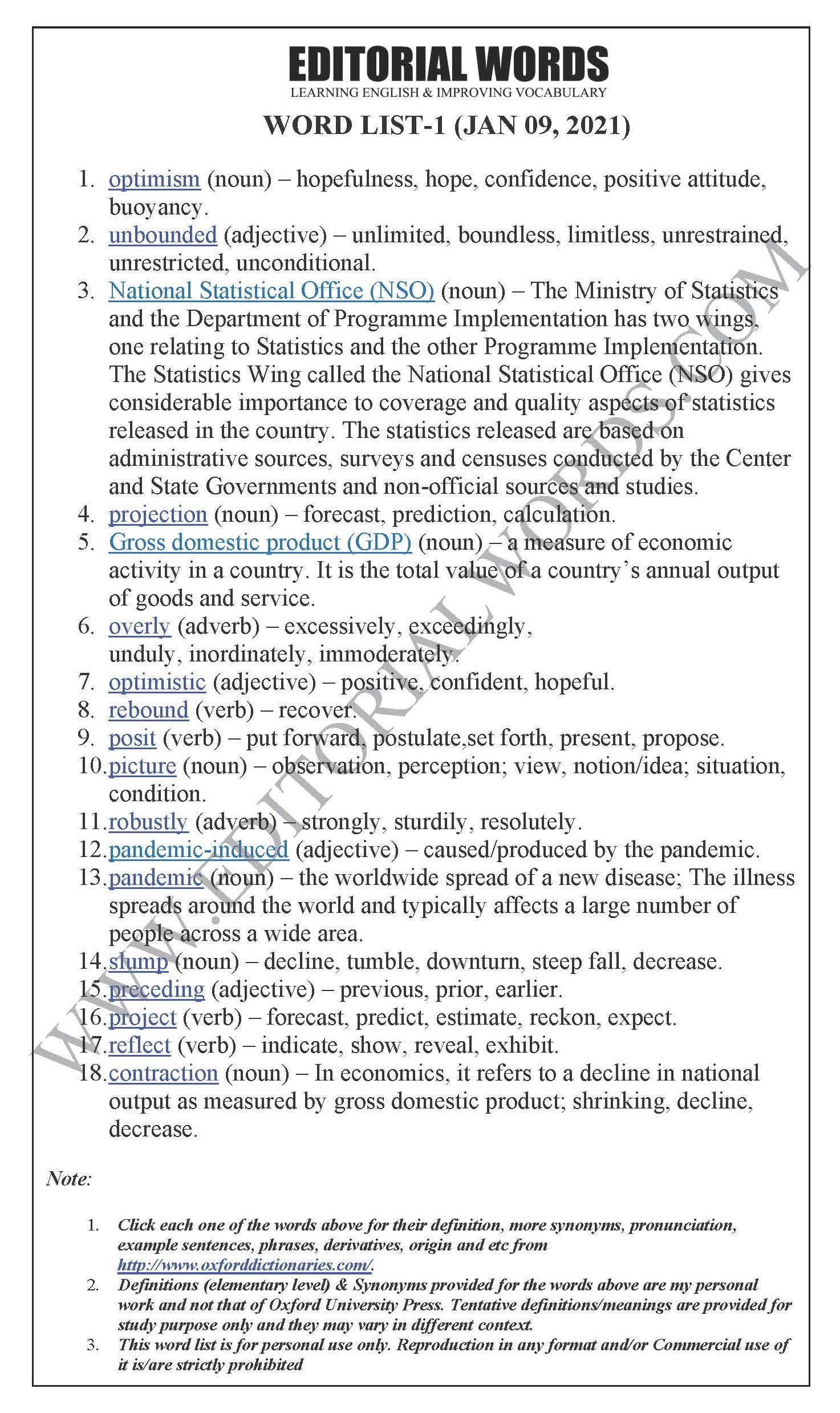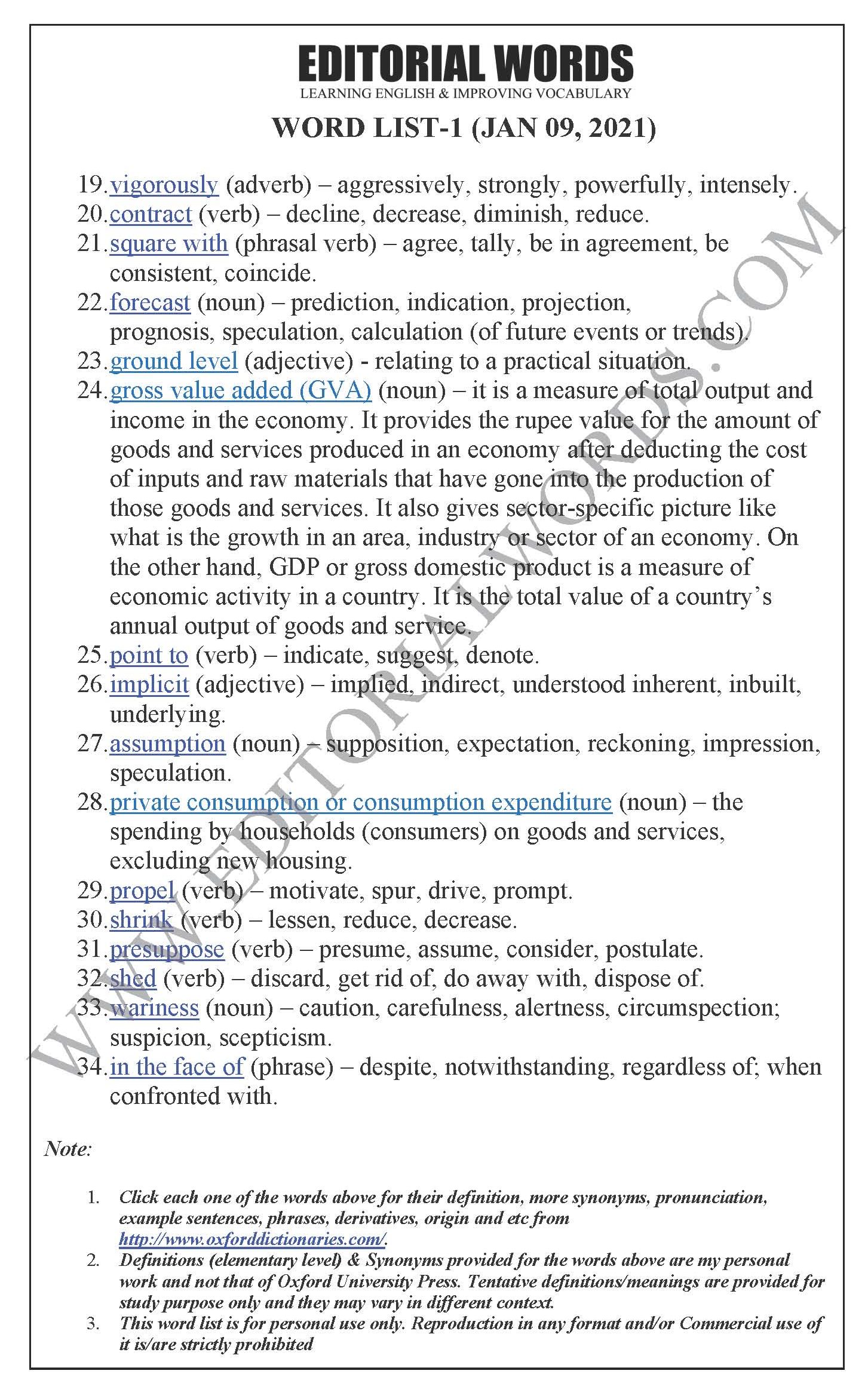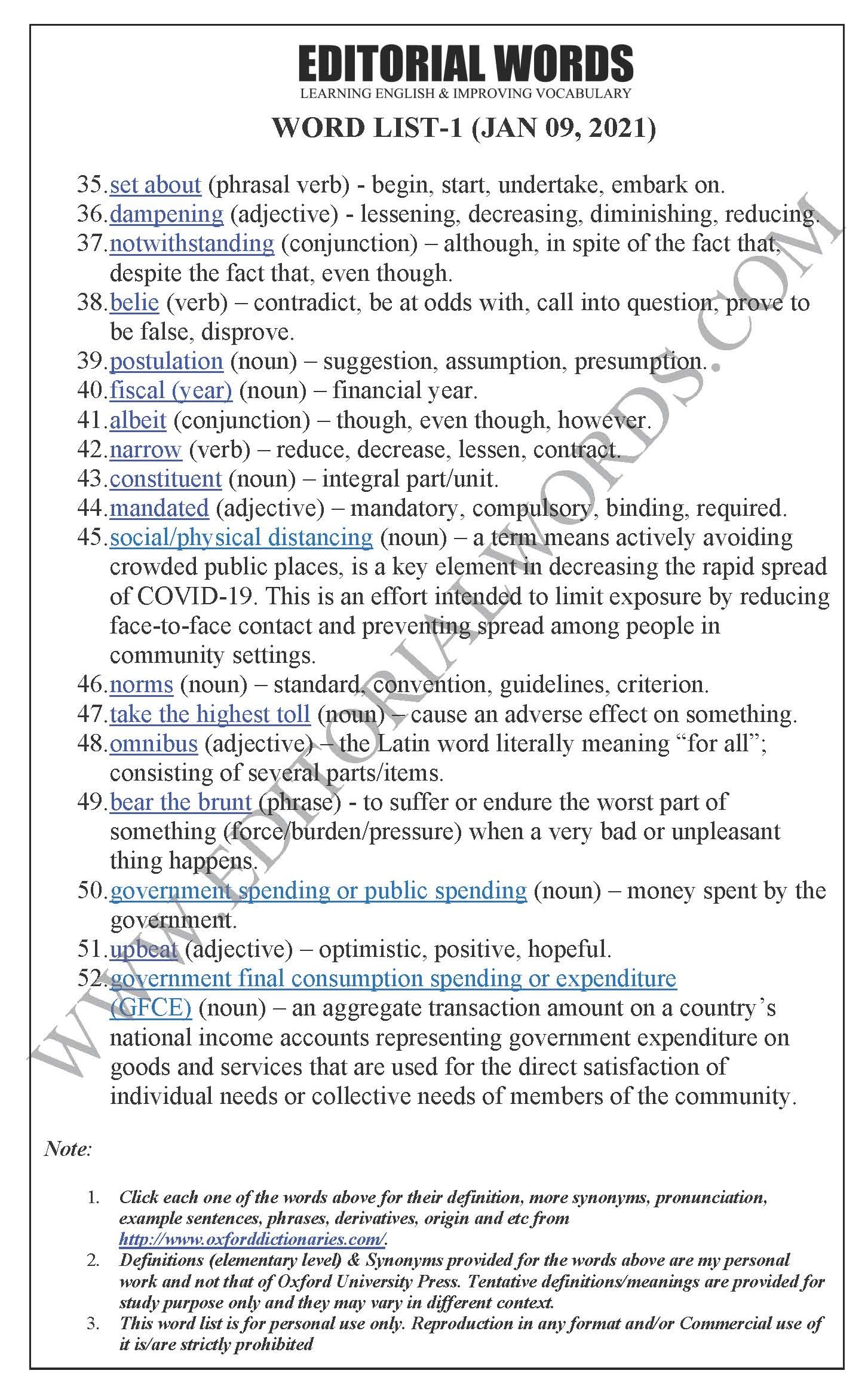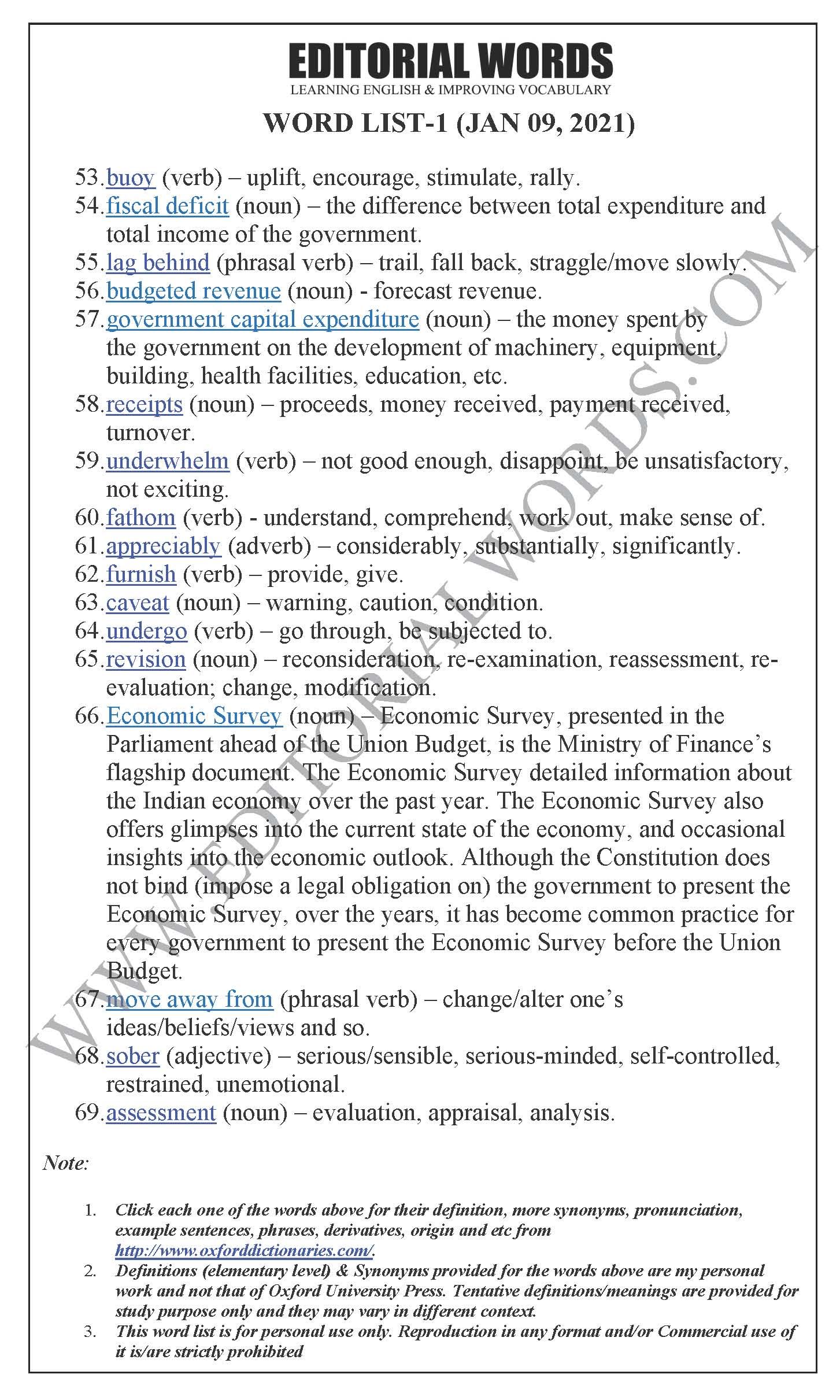The Hindu Editorial (Optimism unbounded) – Jan 09, 2021
The first advanced estimates of economic output for the current financial year posit a picture of an economy rebounding robustly… For further reading, visit “The Hindu”. Below is today’s word list-1 for The Hindu Editorial (Optimism unbounded) – Jan 09, 2021.
To read this article, click here.
This preview is provided here with permission.
Courtesy: The Hindu
Today’s word list-1 for The Hindu Editorial (Optimism unbounded) – Jan 09, 2021:
- optimism (noun) – hopefulness, hope, confidence, positive attitude, buoyancy.
- unbounded (adjective) – unlimited, boundless, limitless, unrestrained, unrestricted, unconditional.
- National Statistical Office (NSO) (noun) – The Ministry of Statistics and the Department of Programme Implementation has two wings, one relating to Statistics and the other Programme Implementation. The Statistics Wing called the National Statistical Office (NSO) gives considerable importance to coverage and quality aspects of statistics released in the country. The statistics released are based on administrative sources, surveys and censuses conducted by the Center and State Governments and non-official sources and studies.
- projection (noun) – forecast, prediction, calculation.
- Gross domestic product (GDP) (noun) – a measure of economic activity in a country. It is the total value of a country’s annual output of goods and service.
- overly (adverb) – excessively, exceedingly, unduly, inordinately, immoderately.
- optimistic (adjective) – positive, confident, hopeful.
- rebound (verb) – recover.
- posit (verb) – put forward, postulate,set forth, present, propose.
- picture (noun) – observation, perception; view, notion/idea; situation, condition.
- robustly (adverb) – strongly, sturdily, resolutely.
- pandemic-induced (adjective) – caused/produced by the pandemic.
- pandemic (noun) – the worldwide spread of a new disease; The illness spreads around the world and typically affects a large number of people across a wide area.
- slump (noun) – decline, tumble, downturn, steep fall, decrease.
- preceding (adjective) – previous, prior, earlier.
- project (verb) – forecast, predict, estimate, reckon, expect.
- reflect (verb) – indicate, show, reveal, exhibit.
- contraction (noun) – In economics, it refers to a decline in national output as measured by gross domestic product; shrinking, decline, decrease.
- vigorously (adverb) – aggressively, strongly, powerfully, intensely.
- contract (verb) – decline, decrease, diminish, reduce.
- square with (phrasal verb) – agree, tally, be in agreement, be consistent, coincide.
- forecast (noun) – prediction, indication, projection, prognosis, speculation, calculation (of future events or trends).
- ground level (adjective) – relating to a practical situation.
- gross value added (GVA) (noun) – it is a measure of total output and income in the economy. It provides the rupee value for the amount of goods and services produced in an economy after deducting the cost of inputs and raw materials that have gone into the production of those goods and services. It also gives sector-specific picture like what is the growth in an area, industry or sector of an economy. On the other hand, GDP or gross domestic product is a measure of economic activity in a country. It is the total value of a country’s annual output of goods and service.
- point to (verb) – indicate, suggest, denote.
- implicit (adjective) – implied, indirect, understood inherent, inbuilt, underlying.
- assumption (noun) – supposition, expectation, reckoning, impression, speculation.
- private consumption or consumption expenditure (noun) – the spending by households (consumers) on goods and services, excluding new housing.
- propel (verb) – motivate, spur, drive, prompt.
- shrink (verb) – lessen, reduce, decrease.
- presuppose (verb) – presume, assume, consider, postulate.
- shed (verb) – discard, get rid of, do away with, dispose of.
- wariness (noun) – caution, carefulness, alertness, circumspection; suspicion, scepticism.
- in the face of (phrase) – despite, notwithstanding, regardless of; when confronted with.
- set about (phrasal verb) – begin, start, undertake, embark on.
- dampening (adjective) – lessening, decreasing, diminishing, reducing.
- notwithstanding (conjunction) – although, in spite of the fact that, despite the fact that, even though.
- belie (verb) – contradict, be at odds with, call into question, prove to be false, disprove.
- postulation (noun) – suggestion, assumption, presumption.
- fiscal (year) (noun) – financial year.
- albeit (conjunction) – though, even though, however.
- narrow (verb) – reduce, decrease, lessen, contract.
- constituent (noun) – integral part/unit.
- mandated (adjective) – mandatory, compulsory, binding, required.
- social/physical distancing (noun) – a term means actively avoiding crowded public places, is a key element in decreasing the rapid spread of COVID-19. This is an effort intended to limit exposure by reducing face-to-face contact and preventing spread among people in community settings.
- norms (noun) – standard, convention, guidelines, criterion.
- take the highest toll (noun) – cause an adverse effect on something.
- omnibus (adjective) – the Latin word literally meaning “for all”; consisting of several parts/items.
- bear the brunt (phrase) – to suffer or endure the worst part of something (force/burden/pressure) when a very bad or unpleasant thing happens.
- government spending or public spending (noun) – money spent by the government.
- upbeat (adjective) – optimistic, positive, hopeful.
- government final consumption spending or expenditure (GFCE) (noun) – an aggregate transaction amount on a country’s national income accounts representing government expenditure on goods and services that are used for the direct satisfaction of individual needs or collective needs of members of the community.
- buoy (verb) – uplift, encourage, stimulate, rally.
- fiscal deficit (noun) – the difference between total expenditure and total income of the government.
- lag behind (phrasal verb) – trail, fall back, straggle/move slowly.
- budgeted revenue (noun) – forecast revenue.
- government capital expenditure (noun) – the money spent by the government on the development of machinery, equipment, building, health facilities, education, etc.
- receipts (noun) – proceeds, money received, payment received, turnover.
- underwhelm (verb) – not good enough, disappoint, be unsatisfactory, not exciting.
- fathom (verb) – understand, comprehend, work out, make sense of.
- appreciably (adverb) – considerably, substantially, significantly.
- furnish (verb) – provide, give.
- caveat (noun) – warning, caution, condition.
- undergo (verb) – go through, be subjected to.
- revision (noun) – reconsideration, re-examination, reassessment, re-evaluation; change, modification.
- Economic Survey (noun) – Economic Survey, presented in the Parliament ahead of the Union Budget, is the Ministry of Finance’s flagship document. The Economic Survey detailed information about the Indian economy over the past year. The Economic Survey also offers glimpses into the current state of the economy, and occasional insights into the economic outlook. Although the Constitution does not bind (impose a legal obligation on) the government to present the Economic Survey, over the years, it has become common practice for every government to present the Economic Survey before the Union Budget.
- move away from (phrasal verb) – change/alter one’s ideas/beliefs/views and so.
- sober (adjective) – serious/sensible, serious-minded, self-controlled, restrained, unemotional.
- assessment (noun) – evaluation, appraisal, analysis.
Note:
1. Click each one of the words above for their definition, more synonyms, pronunciation, example sentences, phrases, derivatives, origin and etc from http://www.oxforddictionaries.com/.
2. Definitions (elementary level) & Synonyms provided for the words above are my personal work and not that of Oxford University Press. Tentative definitions/meanings are provided for study purpose only and they may vary in different context.
3. This word list is for personal use only. Reproduction in any format and/or Commercial use of it is/are strictly prohibited.
Today’s word list-1 The Hindu Editorial (Optimism unbounded) – Jan 09, 2021:




“Phrasal Verbs” We Learnt Last Week
“Idioms & Phrases” We Learnt Last Week
“Important Definitions” We Learnt Last Week
Recent Word Lists For The Hindu Editorial Articles

Be the first to comment